Overview
In the world of software development, teams often grapple with various coding challenges that can hinder progress. How can these challenges be effectively addressed? Kodezi emerges as a solution, offering autonomous code updates that significantly enhance productivity and improve code quality.
Imagine a scenario where development teams can reduce the manual effort involved in maintaining codebases. Kodezi allows for real-time bug detection and automated documentation updates, streamlining the development process. These features not only save time but also foster better collaboration among team members.
As a result, the benefits of using Kodezi are clear: enhanced efficiency, greater agility in development, and a more cohesive team dynamic. Why not explore the tools available on the platform? Discover how Kodezi can transform your coding practices and elevate your team's performance.
Introduction
In the fast-evolving landscape of software development, developers face significant challenges in maintaining efficiency and quality. How can teams effectively manage their codebases while ensuring high standards? Enter Kodezi, an innovative tool designed to revolutionize this process. By automating essential tasks such as OpenAPI specification generation, bug detection, and documentation updates, Kodezi empowers teams to concentrate on what truly matters: creating exceptional software.
Furthermore, Kodezi enhances collaboration among team members, enforces coding standards, and integrates seamlessly across diverse technology stacks. This not only boosts productivity but also mitigates risks associated with manual coding practices. Imagine a scenario where your team can focus on innovation rather than getting bogged down by repetitive tasks.
As organizations increasingly turn to automation to streamline their workflows, Kodezi stands out as a game-changer. It ensures that development teams can keep pace with the demands of modern software engineering while maintaining high standards of quality and security. Why not explore the tools available on the Kodezi platform and experience these benefits firsthand?
Kodezi | Professional OpenAPI Specification Generator - AI Dev-Tool: Automate Code Maintenance and Updates
In today's fast-paced development environment, coding challenges can often hinder productivity. How can developers overcome these obstacles? Enter Kodezi, a professional OpenAPI specification generator that provides autonomous code updates while automating the maintenance of codebases. By seamlessly integrating autonomous code updates into existing workflows, Kodezi ensures that software remains compliant and production-ready, thereby significantly reducing the manual effort required for updates and allowing developers to focus on more critical tasks. The command-line interface (CLI) empowers teams to enhance code quality independently, resolving issues before they reach production and boosting programming productivity. Furthermore, Kodezi automatically creates and sustains API documentation while producing and hosting Swagger UI sites for API testing. This not only improves clarity but also reduces the risk of outdated information, which is crucial for effective collaboration and stakeholder communication.
Entities that adopt automation in their processes have reported a remarkable 40% increase in team efficiency. This statistic underscores the importance of tools like Kodezi in contemporary software creation. Additionally, companies prioritizing comprehensive resources for their users have experienced a 30% reduction in support tickets and a 40% decrease in onboarding time, leading to improved productivity and satisfaction ratings. As the demand for effective software upkeep grows, Kodezi stands out by implementing autonomous code updates that ensure documentation evolves alongside the software, fostering a more agile and adaptive development atmosphere. With features like automatic generation of OpenAPI 3.0 specs and a quick 5-minute demo to see the tool in action, Kodezi CLI is an indispensable asset for enterprise developers aiming to enhance their codebase management. Why not explore the tools available on the platform and see how they can transform your coding practices?
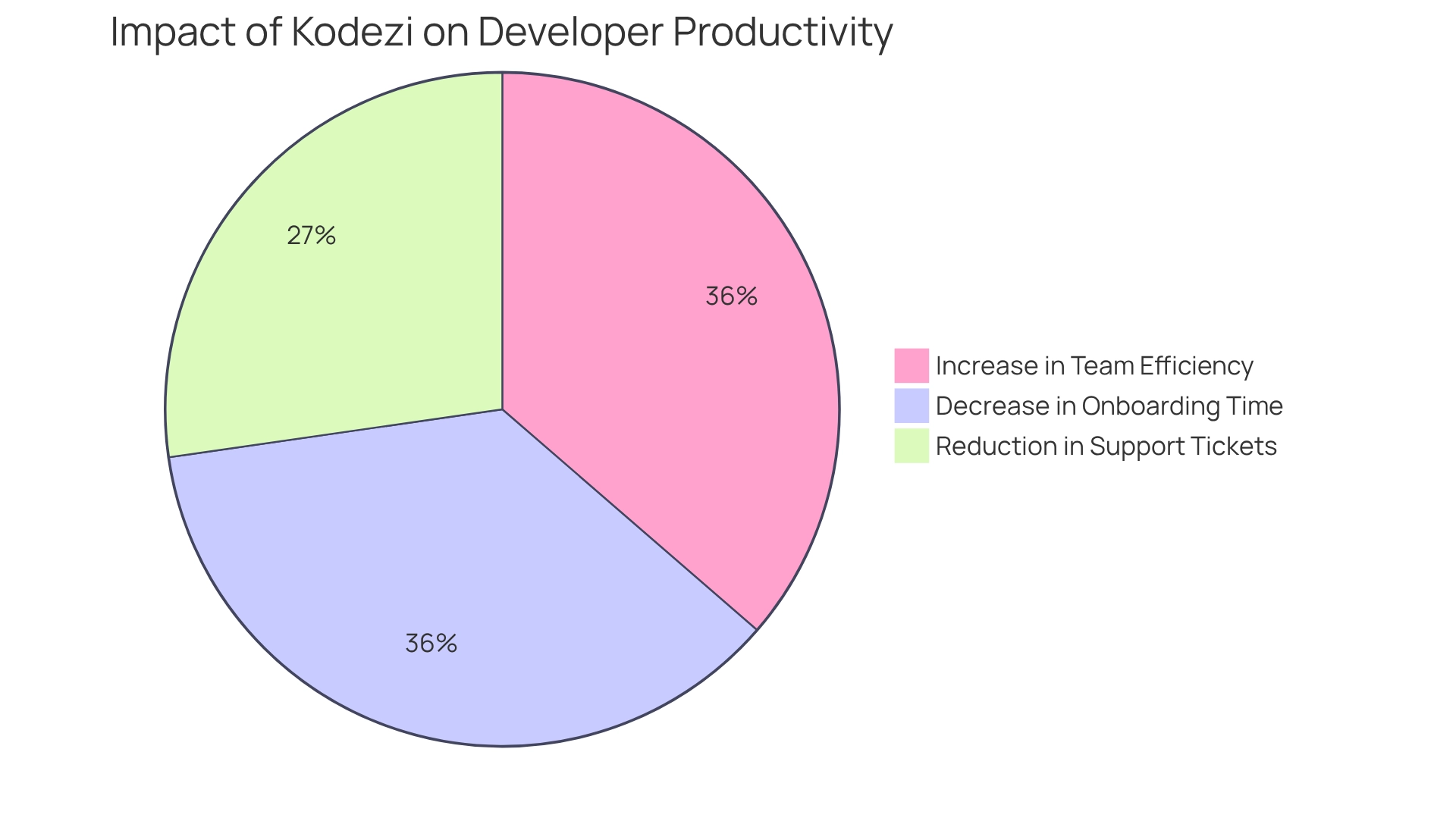
Continuous Integration: Streamline Code Updates and Reduce Deployment Risks
Continuous integration (CI) significantly improves update efficiency by enabling developers to frequently combine their changes into a shared repository. This practice not only reduces integration problems but also promotes early bug identification, which is essential for upholding software quality. By automating the build and testing phases, CI effectively mitigates deployment risks and supports autonomous code updates, ensuring that only stable code is released into production. For instance, teams implementing automated deployment pipelines can achieve release times of under 10 minutes, a stark contrast to the hours or days required for manual processes, resulting in a remarkable 30% increase in release frequency.
Furthermore, the adoption of CI/CD practices is on the rise, with over 50% of Fortune 100 companies utilizing Kubernetes, a popular CI/CD tool. This trend underscores the growing recognition of CI's advantages in software development, particularly through autonomous code updates, which improve deployment success rates and reduce the time spent on deployment activities—by over 20%, according to industry insights. Tools such as this software further enhance these processes by automating bug fixes and ensuring code quality. Users have reported transformative experiences with the software, noting that it has drastically enhanced their productivity and enabled teams to focus on higher-level tasks. These testimonials illustrate how the platform empowers teams to consistently produce high-quality software while minimizing risks associated with deployment.
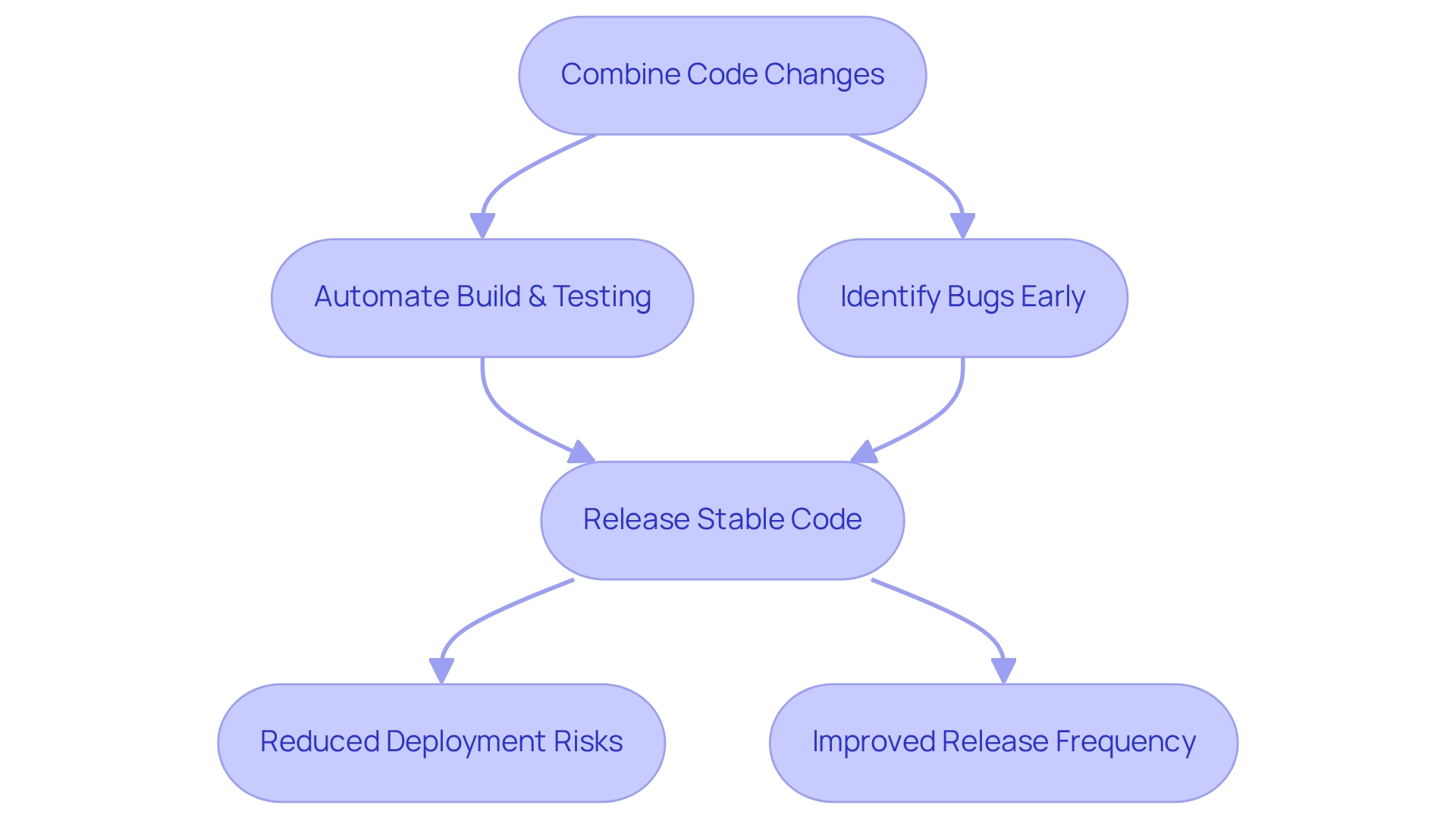
Real-Time Bug Detection: Enhance Code Quality with Immediate Fixes
Coding challenges can be daunting for developers, often leading to frustration and inefficiencies. Real-time bug detection enhances code quality by providing immediate feedback on issues as they occur. Tools like Kodezi, an AI-assisted programming tool, facilitate autonomous code updates by automatically analyzing bugs and proposing fixes. This allows developers to address problems before they escalate, improving the overall quality of the codebase and reducing the time spent on debugging later in the development cycle.
By incorporating real-time detection into their processes, teams can uphold a higher standard of quality and reliability. The tool's capabilities in automatic code correction and bug analysis demonstrate advantages across various programming languages and IDEs, making it suitable for developers of all skill levels. Organizations that have adopted AI-driven solutions report substantial improvements. For instance, one enterprise noted a 40% decrease in security vulnerabilities within just six months.
Furthermore, comprehensive test coverage is crucial. Studies show that organizations with high test coverage experience a 20% reduction in post-release defects, leading to enhanced product quality and lower costs associated with bug fixes. However, sustaining automated tests can be resource-intensive. This makes autonomous code updates by the platform essential for streamlining project cycles and enhancing software quality metrics. As CodeSuite observes, high turnover rates indicate you’ll invest more in recruiting and integrating new talent. This highlights the significance of preserving software quality through automated solutions, including autonomous code updates like Kodezi.
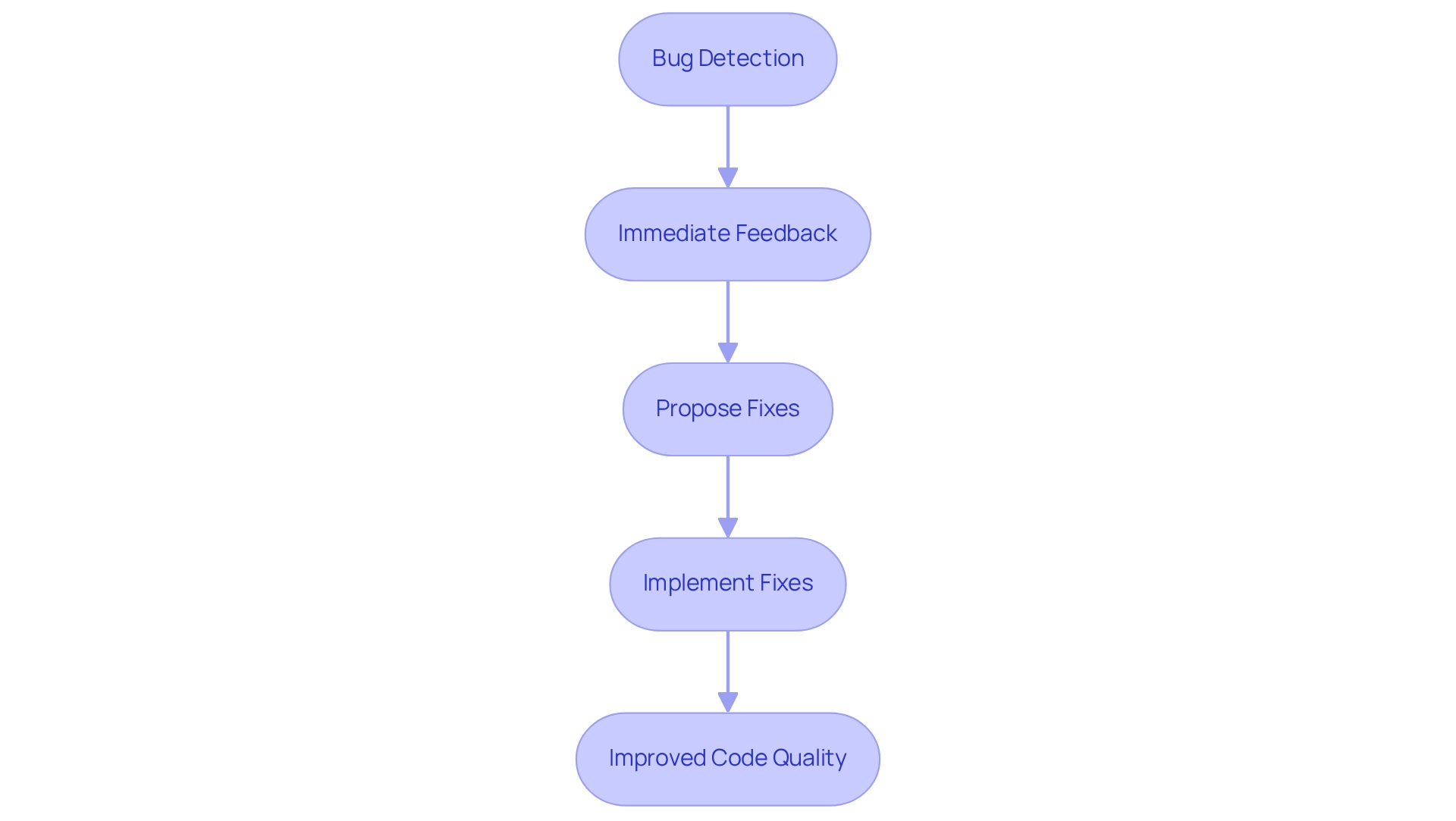
Automated Documentation Updates: Keep Stakeholders Informed with Minimal Effort
In the fast-paced world of software development, keeping documentation updated can be a significant challenge for developers. Autonomous code updates are essential for ensuring automated documentation updates that maintain clarity and communication among stakeholders regarding project progress. Kodezi OS stands out by seamlessly syncing documentation with code changes, which significantly reduces the manual effort typically required to keep documents current. This automation not only saves valuable time but also mitigates the risk of miscommunication and errors that can arise from outdated information.
Furthermore, by utilizing autonomous code updates and streamlining documentation processes, development teams can concentrate on coding while ensuring that all stakeholders have access to precise and timely information. Studies show that teams utilizing automated documentation tools benefit from autonomous code updates, leading to a remarkable improvement in communication efficiency, with documentation updates occurring up to 50% more frequently than in traditional workflows. This proactive approach fosters transparency and clarity, ultimately enhancing collaboration and contributing to project success, and Kodezi exemplifies the philosophy of maximizing your software’s potential through autonomous code updates, ensuring that documentation evolves alongside code without overstretching your budget.
With features such as automatic creation of OpenAPI 3.0 specifications and Swagger UI for API documentation and testing, this tool not only boosts developer productivity but also revolutionizes debugging processes.
To fully utilize these capabilities, teams should incorporate Kodezi into their workflows. User testimonials from over 1,000,000 programmers emphasize substantial enhancements in debugging efficiency and productivity. Are you ready to explore how Kodezi can transform your coding practices and elevate your project's success?
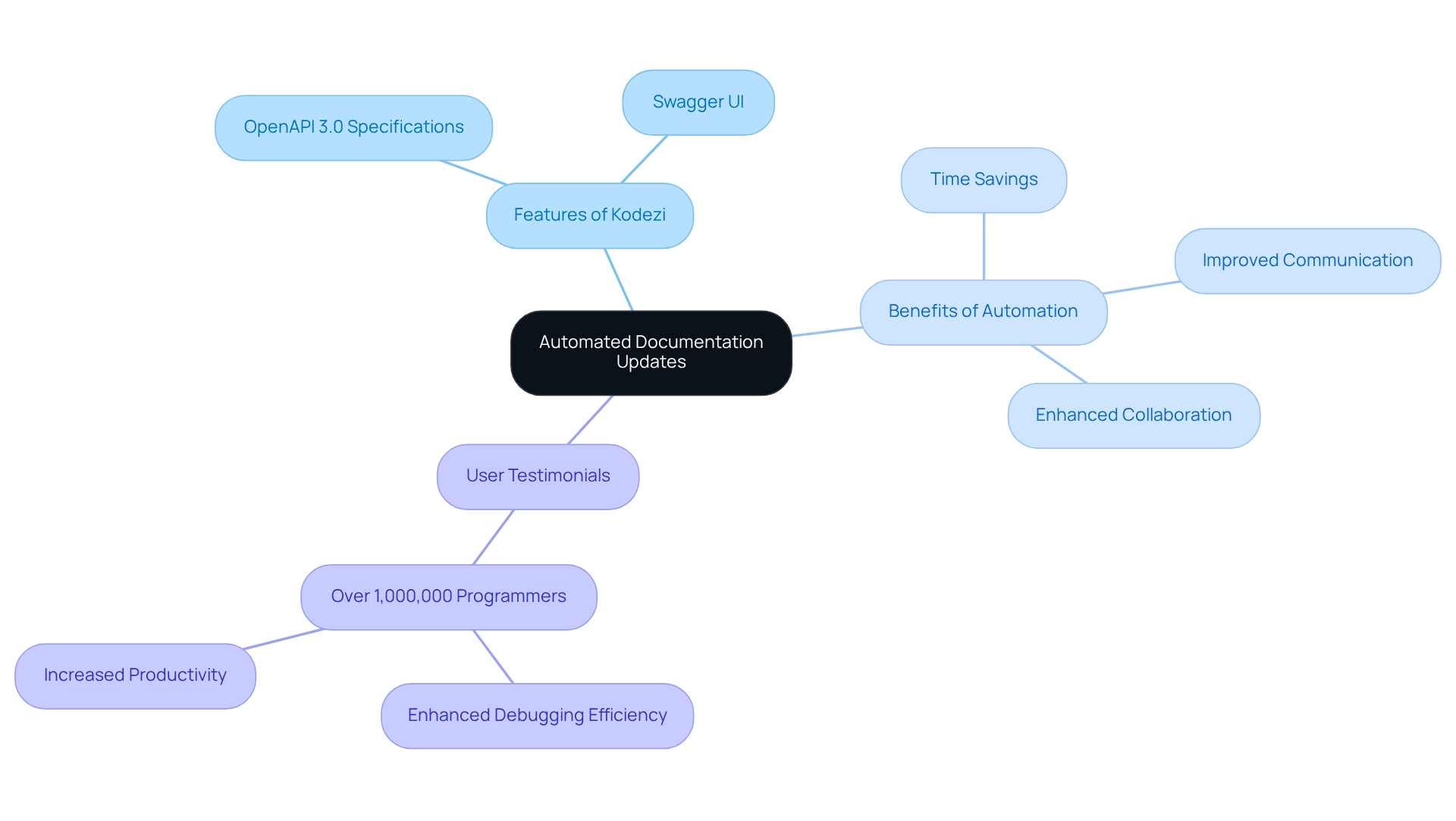
Security Checks: Safeguard Your Codebase with Automated Vulnerability Scans
Automated security checks are crucial for developers facing the challenge of protecting their codebase from potential vulnerabilities. Kodezi OS addresses this concern with its 'Security & Standards' feature, which employs continuous automated vulnerability scans. This feature not only monitors the code for security flaws in real-time but also enforces structural integrity. By proactively identifying and addressing these issues, teams can avert security breaches and ensure adherence to industry standards.
The benefits of using Kodezi extend beyond mere protection; it cultivates trust among users and stakeholders, emphasizing the necessity of a secure development environment. Reports suggest that 91% of software repositories include outdated elements. As Trey Ford, Chief Information Security Officer at Bugcrowd, observes, 'Hearing that 91% of software repositories had outdated components, and a full 90% of all software bases had components more than 10 versions behind comes as no surprise.' This statistic highlights the importance of maintaining up-to-date software to mitigate risks.
Furthermore, accurate Software Bill of Materials (SBOMs) are essential for understanding software composition and enhancing security outcomes, serving as a proxy indicator for software maturity. Kodezi OS contributes to generating accurate SBOMs, which is increasingly crucial as organizations rely on open-source components—20% of which lack proper licensing. Therefore, automated security assessments become essential in reducing risks and ensuring long-term software quality. Why risk your codebase when Kodezi provides the tools to safeguard it effectively?
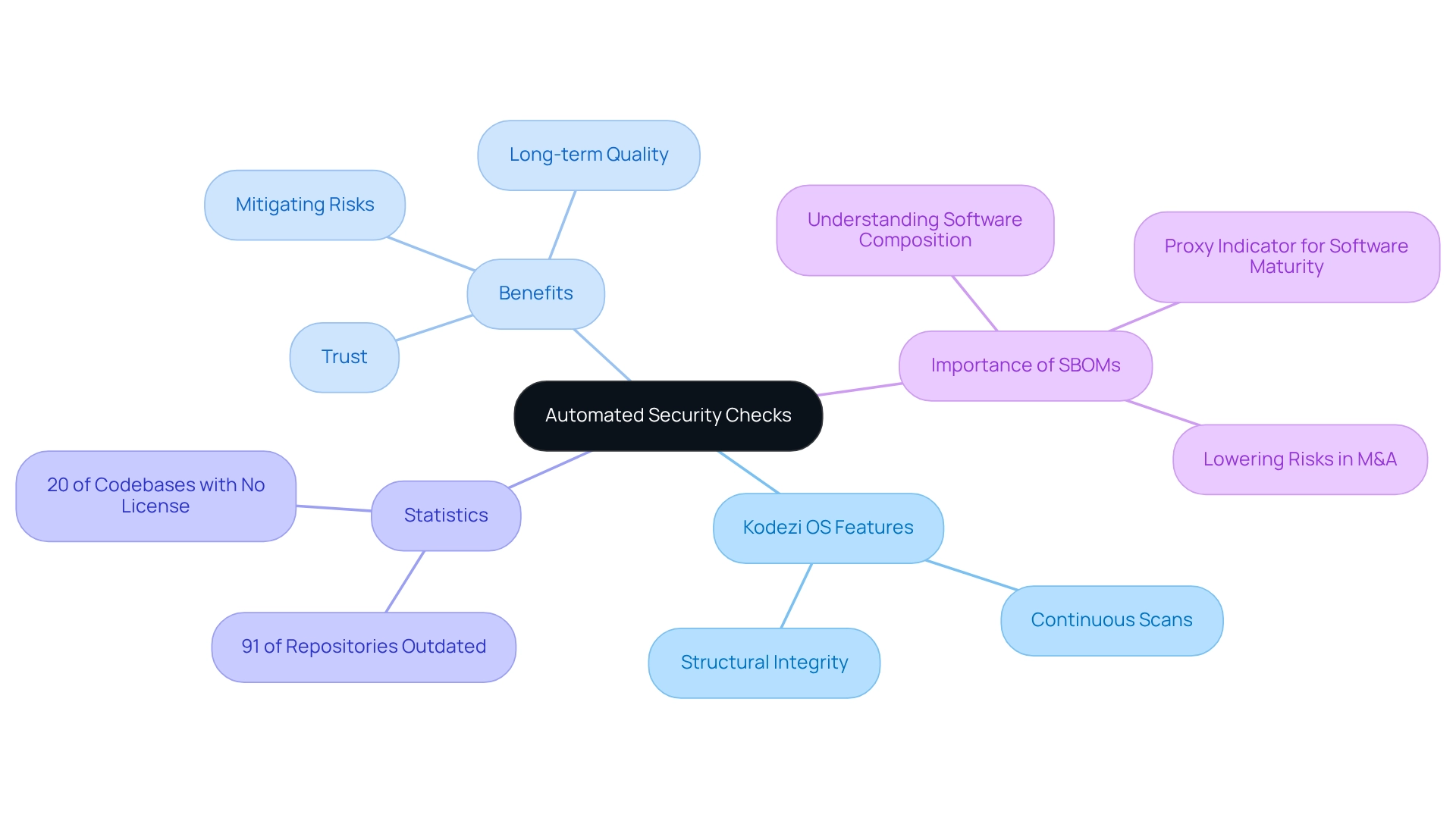
Enforcement of Coding Standards: Maintain Quality and Consistency in Code
Enforcing coding standards is essential for ensuring quality and consistency in code. Have you ever faced challenges in maintaining these standards? Kodezi CLI directly addresses these issues by implementing autonomous code updates that automatically verify compliance throughout the coding process. This solution implementing autonomous code updates not only reduces the likelihood of errors but also fosters collaboration among team members, as everyone adheres to the same conventions. By prioritizing coding standards, teams can enhance code clarity and maintainability, ultimately leading to a more effective development process.
Research indicates that adherence to coding standards, such as those outlined in ISO 26262 for automotive developers, significantly improves software development outcomes. This compliance minimizes bugs and boosts team efficiency. However, as noted by Laura Albrant, while these conventions are crucial, they cannot prevent all types of attacks, highlighting the need for robust tools like CLI. Moreover, the integration of automated tools such as CLI not only facilitates compliance but also reinforces the importance of coding standards in cultivating a culture of quality within teams by enabling autonomous code updates. As Olawale Daniel points out, establishing standards makes web development more enjoyable, showcasing the positive impact of structured guidelines.
Furthermore, a study on automated compliance checking reveals that many existing tools generate excessive false positives, leading to frustration and reduced adherence. Kodezi CLI addresses this challenge by providing relevant compliance checks that minimize noise and enhance the developer experience. By leveraging its capabilities, teams can ensure their codebases remain clean, compliant, and production-ready, ultimately promoting better collaboration and more efficient workflows. Are you ready to explore the tools available on the Kodezi platform?
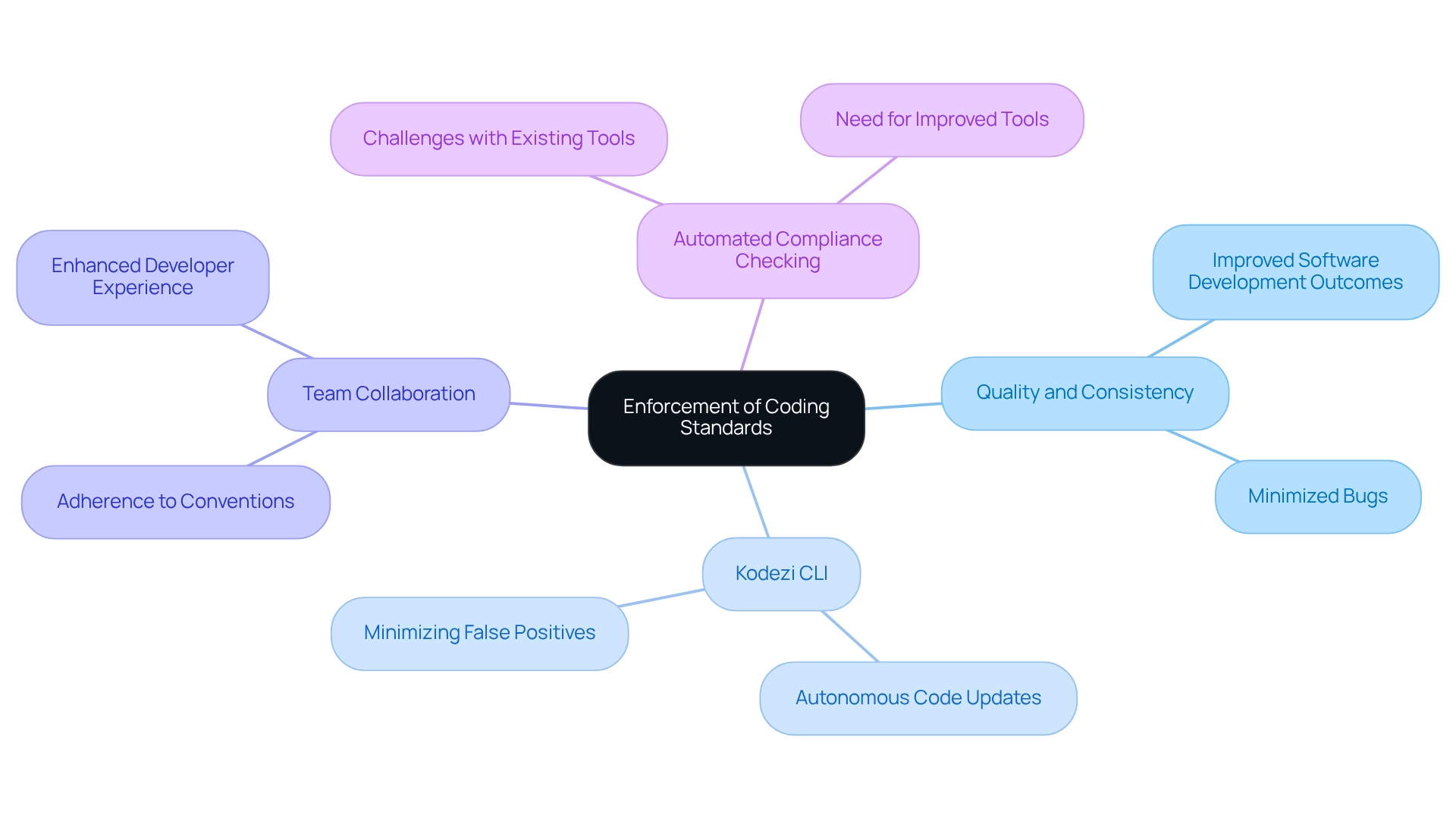
AI Integration: Leverage Intelligent Systems for Smarter Code Updates
Developers often face significant challenges in the coding process, from debugging to optimizing workflows. Incorporating AI into creation processes, such as with Kodezi, addresses these challenges effectively. Kodezi employs smart systems that utilize sophisticated AI algorithms to examine alterations, recognize patterns, and suggest improvements, greatly enhancing the workflow of software creation. By automating routine tasks like bug fixing and test improvement, Kodezi allows developers to focus on more complex challenges, thereby boosting overall productivity and software quality.
Furthermore, this integration accelerates the development cycle and fosters innovation within teams. For instance, generative AI tools like GitHub Copilot have demonstrated that developers can accomplish tasks 55% quicker. Similarly, Shopify has reported a 30% decrease in time spent on standard templates and a 25% increase in overall developer productivity. These examples illustrate how Kodezi can enhance efficiency and quality in coding practices, especially with the implementation of autonomous code updates, as AI technology continues to advance and its role in improving software updates becomes increasingly essential. By harnessing these innovations, developers can drive improvements in quality and efficiency throughout the industry.
Are you ready to explore the tools available on Kodezi's platform to elevate your coding experience?
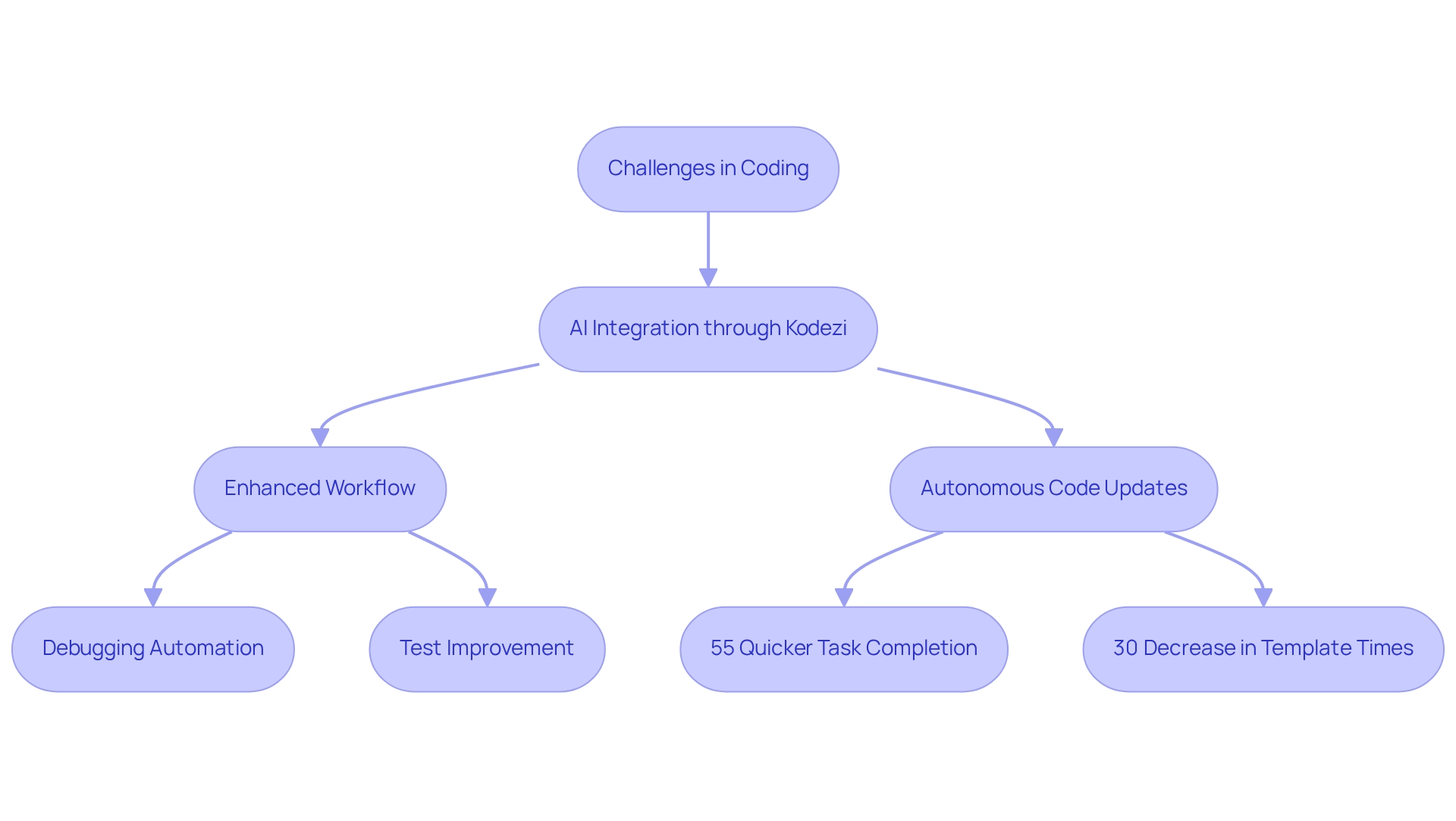
Reduction of Technical Debt: Ensure Long-Term Sustainability with Automated Updates
Coding challenges, particularly technical debt, are a significant concern for developers. The use of autonomous code updates plays a crucial role in mitigating this issue, ensuring the long-term sustainability of codebases. Kodezi OS continuously monitors programming quality, pinpointing areas where technical debt can accumulate. By utilizing autonomous code updates for automating refactoring and updates, teams can proactively address these challenges, preventing them from developing into major obstacles. This approach not only enhances maintainability but also allows teams to focus on delivering new features and improvements without being obstructed by legacy issues.
In fact, research indicates that large organizations face hundreds of millions of dollars in unpaid technical debt, underscoring the importance of addressing these concerns through automation. By utilizing autonomous code updates, development teams can significantly reduce technical debt, fostering a healthier and more agile programming environment. How can automated updates transform your coding practices? User testimonials further illustrate its transformative impact:
- "It has helped me find and fix bugs faster and easier than trying to do so manually," shares a user.
- Deven from the Massachusetts Institute of Technology states, "It is a lifesaver when it comes to correcting issues and bugs."
- Pradeep from the Indian Institute of Technology Delhi adds, "This is such a good website for troubleshooting programs; I truly appreciate the new updates every week and hearing our feedback!"
These insights demonstrate how the CLI operates as a flexible resource for teams, independently elevating code quality and resolving issues prior to deployment. Ultimately, this boosts programming efficiency and empowers developers to focus on what truly matters: innovation and improvement.
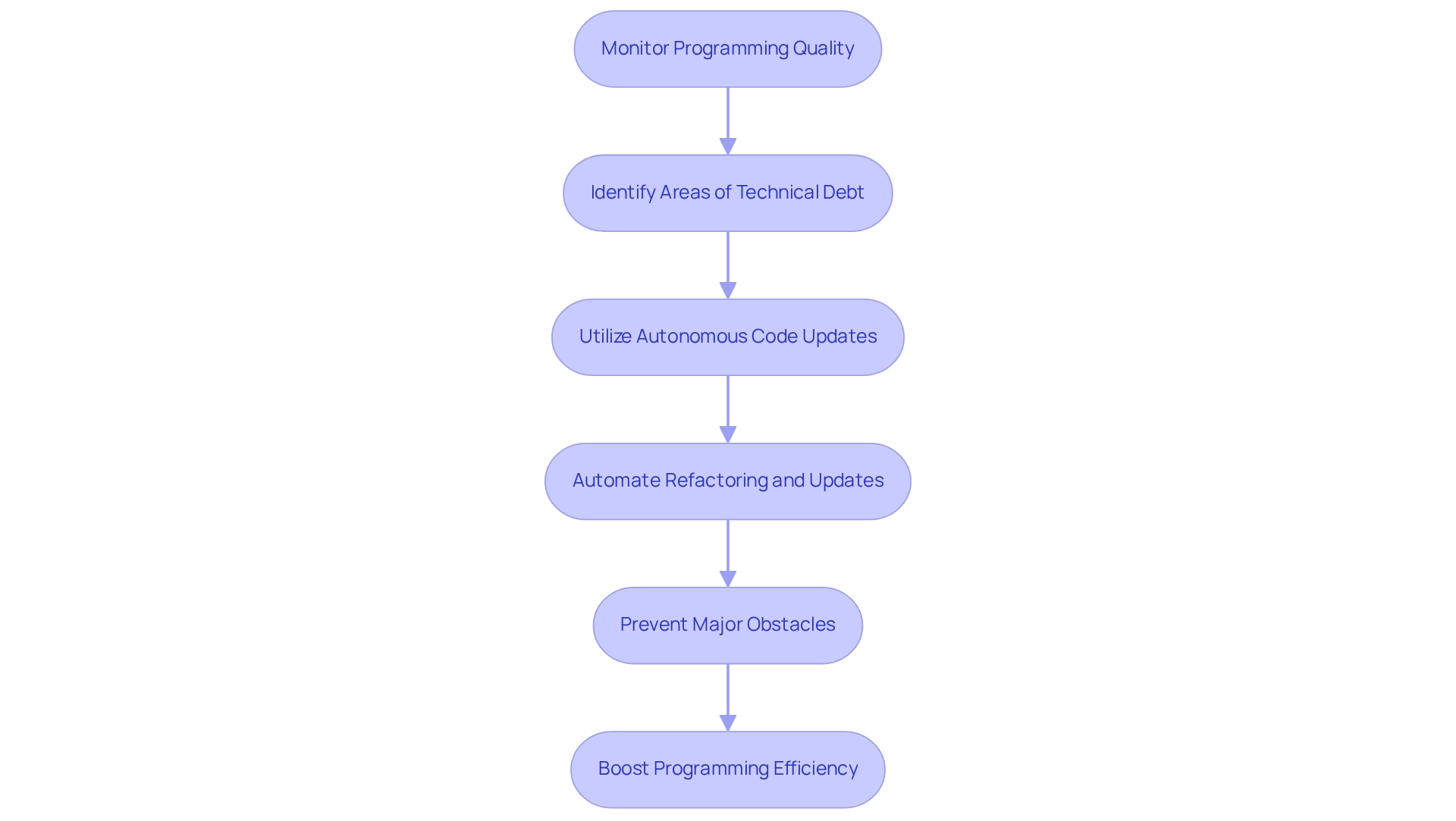
Cross-Platform Compatibility: Simplify Updates Across Diverse Technology Stacks
Cross-platform compatibility is essential for streamlining updates across various technology stacks. It allows development groups to provide a uniform user experience. The operating system supports a wide array of programming languages and frameworks, enabling developers to implement updates effortlessly across different platforms. This capability significantly reduces the complexity associated with managing multiple codebases. Consequently, users can enjoy the same high-quality service, regardless of their chosen platform.
Furthermore, by prioritizing cross-platform compatibility, development groups can enhance their operational efficiency and expand their reach. This ultimately leads to improved user satisfaction. As the market for cross-platform software continues to expand at a CAGR of 15.45% from 2024 to 2031, the significance of sustaining varied technology stacks becomes increasingly evident. This positions the operating system as an essential resource for contemporary engineering groups.
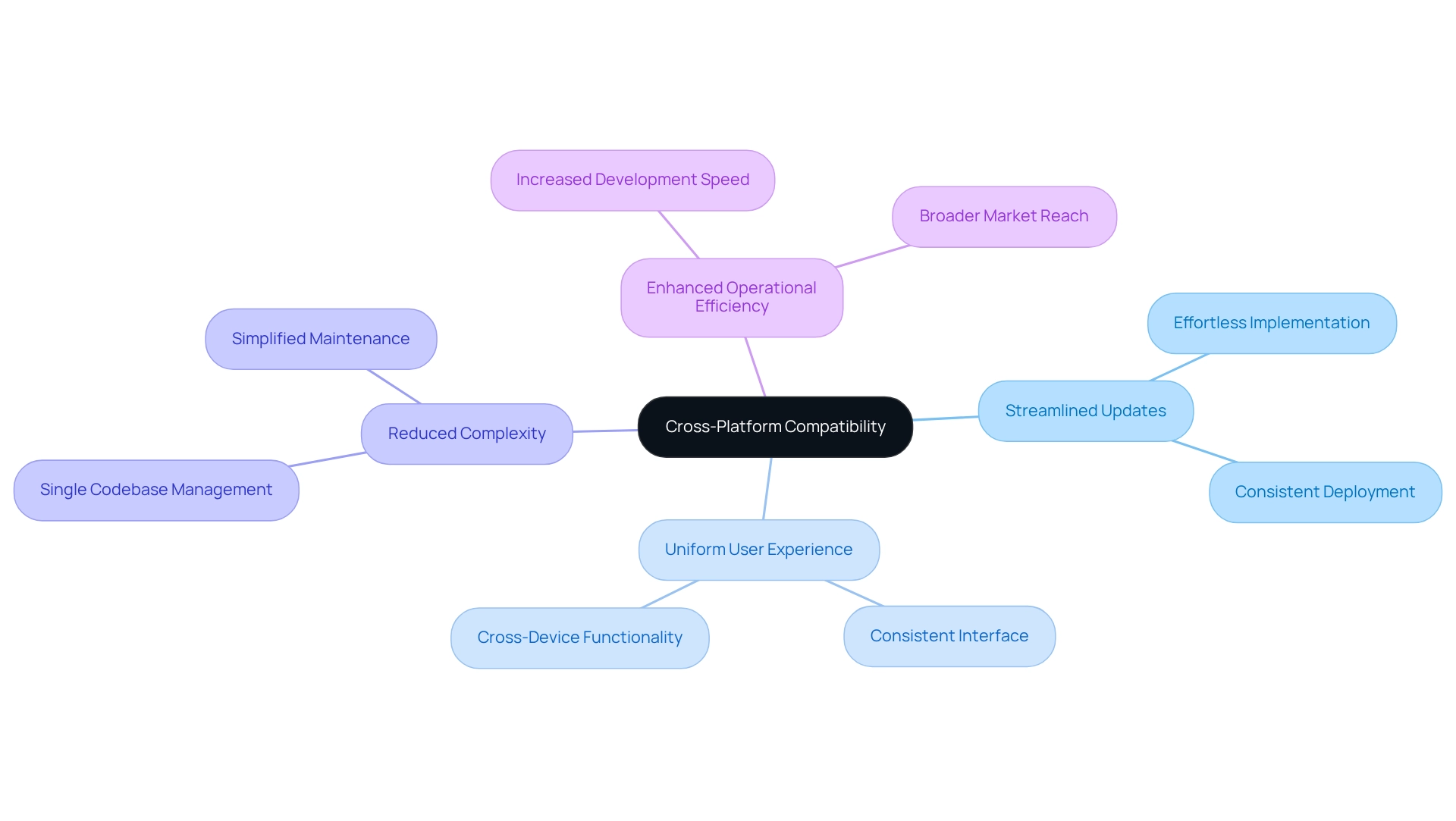
Enhanced Team Collaboration: Foster Communication Through Automated Code Updates
Coding challenges can often hinder developers' productivity and collaboration. Autonomous code updates greatly enhance group collaboration by ensuring that all members are aligned on changes. Kodezi seamlessly integrates with communication platforms like Slack and GitHub, delivering real-time notifications about code modifications and fixes. This level of transparency encourages open dialogue among group members, reducing misunderstandings and conflicts. Furthermore, groups can work together more effectively, resulting in enhanced project results.
Have you ever faced miscommunication within your team? By streamlining collaboration with autonomous code updates, Kodezi not only enhances team dynamics but also contributes to a more productive development environment. Organizations that empower their staff to make assigned decisions experience a 3.9 times rise in success rates, highlighting the significance of efficient communication in software creation.
In addition, Kodezi’s features allow for a smoother workflow, ultimately leading to better code quality. Explore the tools available on the platform and see how Kodezi can transform your development process.
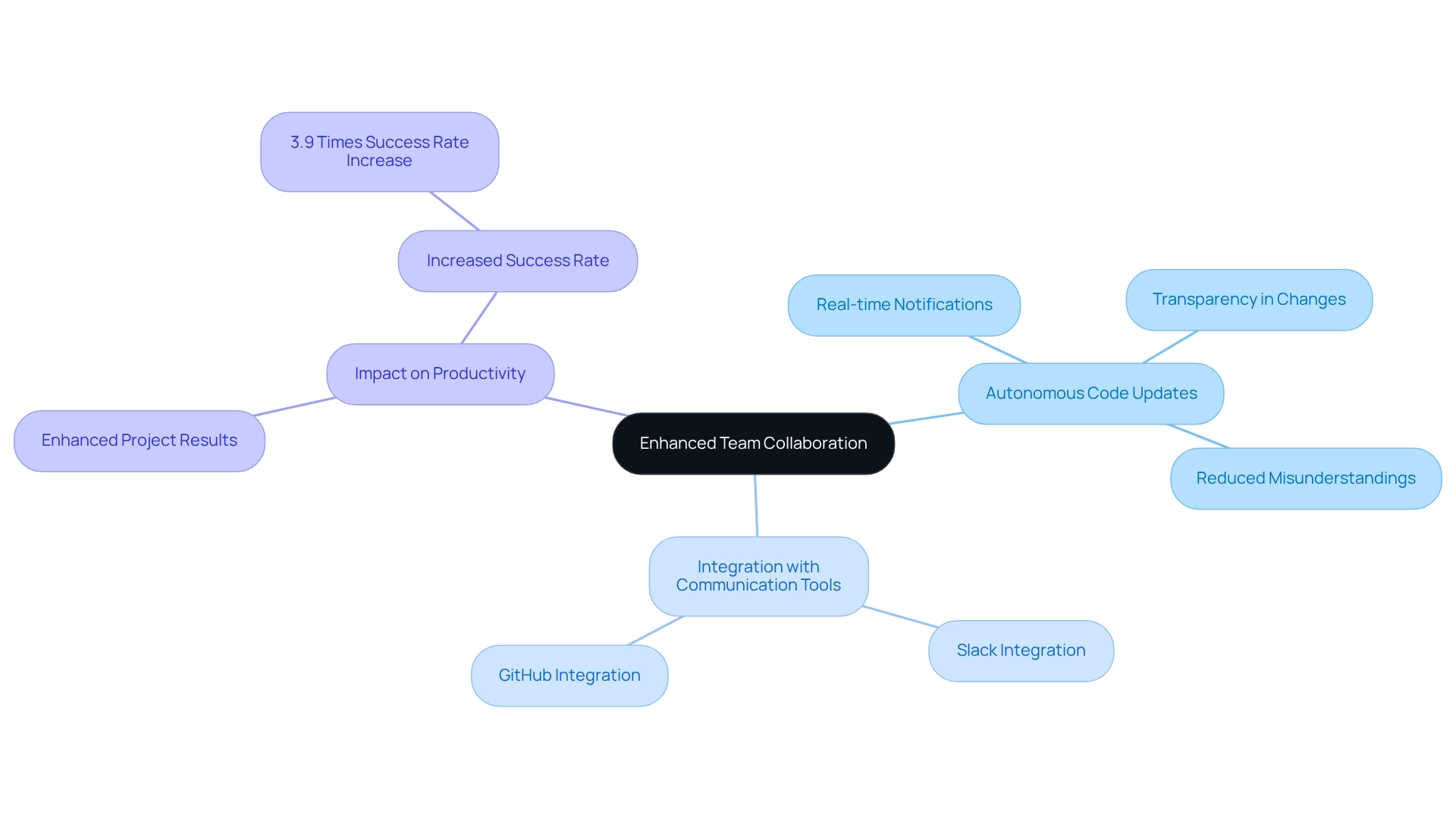
Conclusion
In today's fast-paced software development landscape, teams face numerous coding challenges that can hinder their progress. Kodezi emerges as a comprehensive solution, automating critical tasks such as:
- OpenAPI specification generation
- Bug detection
- Documentation updates
This allows developers to redirect their focus towards innovation, freeing them from the constraints of repetitive tasks. With Kodezi, the enhancement of code quality and maintainability is not just a possibility; it’s a reality that significantly boosts team productivity and collaboration.
Furthermore, Kodezi prioritizes:
- Real-time bug detection
- Automated security checks
- The enforcement of coding standards
These features empower teams to deliver high-quality software while mitigating risks. Organizations utilizing Kodezi have reported substantial increases in efficiency and decreases in technical debt, leading to a more agile and sustainable development environment.
As the demand for streamlined workflows and quality assurance continues to rise, adopting Kodezi is not merely a strategic advantage; it is becoming a necessity for development teams striving to keep pace with the evolving software engineering landscape. Embracing this innovative tool sets the stage for a future where codebases are not only well-maintained but also continuously enhanced, fostering a culture of excellence and collaboration among developers. Are you ready to explore the tools available on the Kodezi platform and elevate your development processes?
Frequently Asked Questions
What is Kodezi and how does it help developers?
Kodezi is a professional OpenAPI specification generator that provides autonomous code updates and automates the maintenance of codebases. It integrates seamlessly into existing workflows, ensuring software compliance and reducing manual update efforts, allowing developers to focus on critical tasks.
How does Kodezi improve code quality and productivity?
Kodezi enhances code quality by enabling teams to resolve issues before they reach production, which boosts programming productivity. It also automatically creates and maintains API documentation and hosts Swagger UI sites for API testing, reducing the risk of outdated information.
What impact does automation have on team efficiency?
Entities that adopt automation in their processes have reported a 40% increase in team efficiency. Additionally, companies that prioritize comprehensive resources for users have seen a 30% reduction in support tickets and a 40% decrease in onboarding time.
What role does Continuous Integration (CI) play in software development?
CI improves update efficiency by allowing developers to frequently combine changes into a shared repository, which reduces integration problems and promotes early bug identification. It automates build and testing phases, mitigating deployment risks and supporting autonomous code updates.
What are the benefits of implementing CI/CD practices?
Implementing CI/CD practices can lead to release times of under 10 minutes, resulting in a 30% increase in release frequency. It also improves deployment success rates and reduces the time spent on deployment activities by over 20%.
How does Kodezi assist with real-time bug detection?
Kodezi provides real-time bug detection by analyzing bugs and proposing fixes, allowing developers to address issues immediately, which enhances code quality and reduces debugging time later in the development cycle.
What are the advantages of high test coverage in software development?
Organizations with high test coverage experience a 20% reduction in post-release defects, leading to improved product quality and lower costs associated with bug fixes.
Why are autonomous code updates important for software quality?
Autonomous code updates streamline project cycles and enhance software quality metrics, making them essential for maintaining high standards of quality and reliability, especially in environments with high turnover rates.




